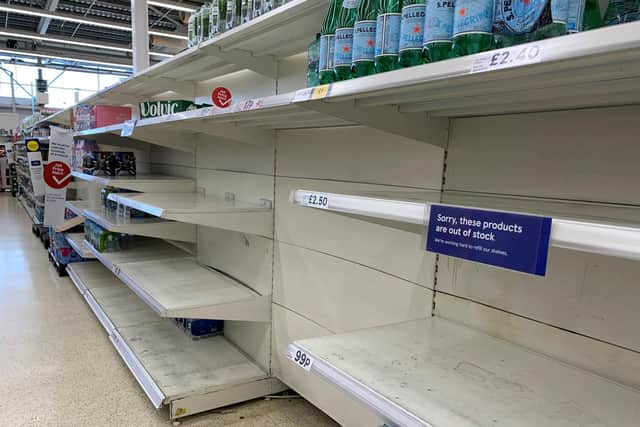UK growth stalls as shortages dent recovery: reaction
Fresh figures from the Office for National Statistics (ONS) show that gross domestic product (GDP) rose by 0.1 per cent in July, a slowdown from 1 per cent expansion in June.
Companies had faced problems with the so-called "pingdemic" and shortages of materials - especially in the construction sector.
Advertisement
Hide AdAdvertisement
Hide AdRetailers saw declines, while lawyers also took a hit because of the tapering-off of the stamp duty holiday.


ONS deputy national statistician for economic statistics Jonathan Athow said: "After many months during which the economy grew strongly, making up much of the lost ground from the pandemic, there was little growth overall in July.
"Oil and gas provided the strongest boost, having partially bounced back after summer maintenance. Car production also continued to recover from recent component shortages."
He added: "The service sector saw no growth overall with growth in IT, financial services and outdoor events - which could operate more fully in July - offsetting large falls in retail and law firms.
"Meanwhile, rising costs and shortages of raw materials pegged back the construction sector again."
Economists had expected a slowdown in GDP growth in July, although this was forecast at 0.5 per cent, according to an average of economist predictions compiled by Pantheon Macroeconomics.
The figures put a dent in the recovery from the pandemic. GDP is still 2.1 per cent behind its February 2020 level, just before the pandemic hit.
Susannah Streeter, senior investment and markets analyst at financial services group Hargreaves Lansdown, said: “With the wild horses of recruitment difficulties, product shortages and spikes in infection rates running loose, it’s little surprise they dragged back UK economic recovery in July.
Advertisement
Hide AdAdvertisement
Hide Ad“The ongoing struggle to hire staff isn’t going away any time soon, with post Brexit rules making hiring many workers from Europe difficult. These are not just temporary bottle necks with a skills gap looming for so many industries, driving up staff wages and inflation.”
Sam Fuller, director of Financial Markets Online, noted: “The wheels haven’t yet come off Britain’s recovery, but they are wobbling. With growth in the UK’s dominant services sector flatlining and retail sales falling, the markets are rapidly recalibrating their expectations.”
The ONS also reported on the UK's trade figures. The trade deficit - the difference between imports and exports - widened by £1.5 billion to £4.9bn in July.
Imports of goods rose by 5.8 per cent to £6.3bn in the three months to July, while exports increased 5.7 per cent to £4.5bn.
Imports of goods fell from EU countries, driven especially by clothing and footwear imports.
The British Chambers of Commerce’s head of trade policy, William Bain, said: “Overall, the figures remain concerning. Taken in conjunction with German trade data from earlier this week, the UK is clearly doing less trade with the EU than three years ago.
“The data also points to the effects labour shortages, particularly among HGV drivers, are having on exports.”
A message from the Editor:
Thank you for reading this article. We’re more reliant on your support than ever as the shift in consumer habits brought about by coronavirus impacts our advertisers. If you haven’t already, please consider supporting our trusted, fact-checked journalism by taking out a digital subscription: www.scotsman.com/subscriptions
Comments
Want to join the conversation? Please or to comment on this article.
